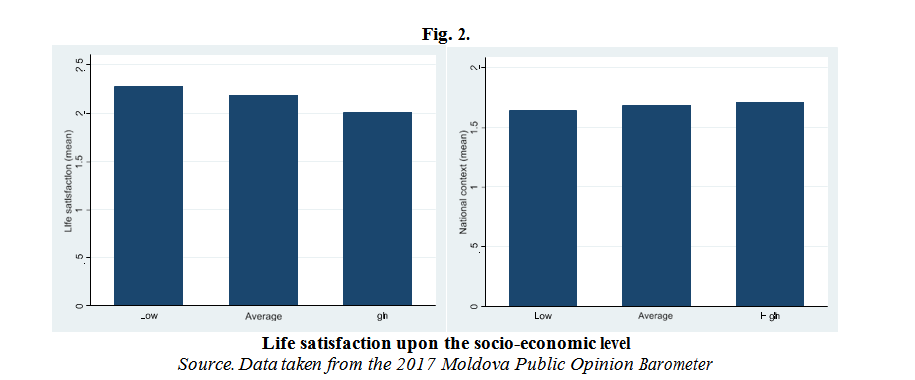Political trust and happiness

Abstract
Using microdata from the 2017 Moldova Public Opinion Barometer, this paper aims to examine whether a higher political trust at the level of individuals is associated to higher levels of satisfaction with life, with the national context, and with the international context. Three different variables of satisfaction are therefore comparatively examined to check the consistency of the political trust positive effect.
The results indicate a positive effect that is consistent across different types of satisfaction, which is in line with the literature. Moreover, the paper examines the effect of other determinants beside control variables on the three indicators of satisfaction. The results could be useful for policy purposes because they indicate that a powerful governance could result into a higher quality of life.
Table of Contents:
1. Introduction
2. Literature overview
3. Data and method
4. Empirical Analysis
5. Conclusions
1. Introduction
The literature on well-being is broad and different issues in this area have been investigated over time, e.g. the relationship of well-being with political trust. This relationship has been studied using different theoretical, quantitative and qualitative approaches, many disciplines being at the core of this interdisciplinary topic. Although a positive relation is generally found, the using dataset was the main driver of the output differences. The novelty of this paper comes from the country focus, Moldova – a country which was not previously studied from the point of view of this topic. Despite of being included in cross-country studies, Moldova benefits from very few analyses exclusively focusing only on it. From this perspective, this paper comes to fill a gap in the literature.
At present, and in the last 30 years as well, Moldova is considered one of the poorer East- European countries. Like other papers note, the loss of Transnistria as well as the failure of the communist regime and of the centralized economy which leaded to the dissolution of the Soviet Union in 1999, have all determined a serious economic decline and a high poverty rate of 71% in 1996 (e.g., CIVIS, 2010). These objective economic and social dynamics suggest rather a low satisfaction, as well as low levels of well-being and political trust at the level of individuals in Moldova, and this is in fact the main motivation of this paper.
The importance of the paper is twofold. First, it investigates the main drivers of satisfaction with life, national and international context, and second it examines whether improving governance as to increase public/political trust is not only good for the country, but it equally led to a better life for citizens.
The paper is structured in four sections, i.e., the first one is Introduction, the second section presents a very brief literature review, the third section describes the data and methods, the fourth section is the empirical analysis, while the last one formulates conclusions and policy recommendations.
2. Literature overview
The concept of political trust as well as the relationship between political trust and happiness have been widely debated in the literature, being approached in the framework of different disciplines such as economics, social and political sciences, and psychology. Given that in theory trust is separately analysed in relation to institutions and persons, political trust should be placed in the area of trust in institutions. In contrast to the interpersonal trust, the political trust is always conditional (Brooks and Cheng 2001) upon the quality of different types of institutions, such as: government, army, church, police, NGOs, media channels and international organisations Papadakis (1999). In fact, the political trust reflects the individuals’ confidence that the political regime will produce positive outcomes according to their expectations (Hetherington 1998; Mishler and Rose 2001), being therefore the connection of the political regime to the public (Bianco, 1994).
Although political trust has been previously analysed especially as a tool for enhancing legitimacy in the field of political science, there is a body of literature studying the relationship between subjective well-being and political trust. Most findings indicate a positive association between them, at both the individual and aggregate levels. Recently Liang (2016) finds a positive relationship between political trust and individual well-being, although Newton and Norris (2000) consider that only the collective levels of political trust should be compared, because political trust at the aggregate level can be viewed as a stock affected by governance and a contextual property of societies in which individuals live. Fu (2018) finds that in China, individuals are happier when living in places with higher levels of stock of political trust.
In the literature, two approaches are used to explain political trust: (1) the institutional approach which associates political trust to the individual’s response to the performance of political system, and (2) the cultural approach, which claims the role played by the cultural norms and values of people (Mishler and Rose 2001). Although political trust is generally linked to economic performance, economic growth and corruption are found to be the most important drivers of political trust in the Central and Eastern European countries, including Moldova (Mishler and Rose, 2001; Fu, 2018).
3. Data and method
The microdata is taken from the 2017 Moldova Public Opinion Barometer, which includes 1103 individuals of adult age from more than 80 Moldovan localities. The survey is representative at national level for the adult population.
Three variables are used in the empirical analysis to describe different types of individuals’ satisfaction:
• In the world things go in the right or wrong direction (abbreviated “international context”)
• In Moldova things go in the right or wrong direction (abbreviated “national context”)
• How happy are you with the way you live (abbreviated “life satisfaction”)

All three variables of satisfaction are ordinal variables having three orderly categories. The same set of independent variables is used in all models. The political trust, represented in our dataset by the satisfaction with the national government, is at the core of our research. It has four categories, and as shown in Fig. 1, just a small proportion of population completely trust the Moldova government. Beside this variable, other control variables are used to better explain the individuals’ satisfaction: political trust, education and savings (ordinal variables), being employed, urban, Moldovan, and income satisfaction (dummy variables), family members, age, and age square (continuous variables).
The order probit repression is the technique used in the empirical section because the dependent variable is an ordinal one.
4. Empirical Analysis
In Tab. 1 the impact of political trust on three different measures of individual satisfaction is explain upon the same set of independent variables. In particular we look at the effect of political trust on life satisfaction (Model 1), satisfaction with the international context (Model 2), and satisfaction with the national context (model 3). Given that all our dependent variables are ordinal variables, a series of ordered probit regressions will be used in all models.
Table 1. Drivers of life satisfaction
|
Explanatory variable |
Coefficients/St. err. Model 1 |
Coefficients/St. err. Model 2 |
Coefficients/St. err. Model 3 |
|
Political trust |
0.32*** (0.04) |
0.35*** (0.05) |
0.58*** (0.06) |
|
Employed |
-0.20*** (0.008) |
-0.17* (0.10) |
-0.23** (0.10) |
|
Urban |
-0.007 (0.08) |
-0.15* (0.09) |
-0.26*** (0.09) |
|
Family members |
-0.04* (0.02) |
0.01 (0.03) |
0.03 (0.03) |
|
Moldovan |
0.20** (0.09) |
-0.07 (0.10) |
0.21** (0.11) |
|
Savings |
-0.37*** (0.09) |
-0.07 (0.10) |
-0.40*** (0.11) |
|
Income satisfaction |
-0.21*** (0.04) |
-0.08* (0.04) |
0.07 (0.05) |
|
Education |
-0.02 (0.06) |
0.19*** (0.07) |
0.13** (0.07) |
|
Age |
0.04*** (0.01) |
-0.04** (0.01) |
-0.04*** (0.01) |
|
Age square |
-0.0004*** (0.0001) |
0.0005*** (0.0001) |
0.0004*** (0.0001) |
Notes. Ordered probit regression; *** p<0.01, ** p<0.05, * p<0.1.
According to all models (1)-(3), the political trust generates a significant and powerful effect on all indicators of satisfaction (with life, national and international dynamics). A high political trust is therefore responsible not only with the life satisfaction, but also with the satisfaction with the national and international context.
Another finding which is consistent across all three models is in fact the negative relationship between all levels of satisfaction and the status of “unemployed”. Unemployed are more likely to be satisfied with life, as well as with national and international dynamics. This is according to a large strand of literature, e.g., Böckerman and Ilmakunnas (2006) and, Knut, G. and Gesine, S. (1996).
A higher level of education has no significant impact on life satisfaction, but carries a positive effect on both satisfaction with national and international context. This is according to our expectations since more educated people generally have a better understanding of national and international events.
The impact of age on all indicators of well-being is also significant but it varies across models.
Older people have a greater satisfaction with life, while younger people feel happier with the national and international context. At this point the literature provides different findings, depending on cohorts, countries and surveys (Stepoe et al., 2015).
It is interesting to note that a higher proportion of savings from total income results in a lower satisfaction with life and with the national context. Low levels of savings and low-income levels are therefore associated to a greater satisfaction.
In Fig. 2 the life satisfaction is presented upon three socio-economic levels, just to suggest that life satisfaction is more different across the three categories than satisfaction with national context.

5. Conclusions
As explained in Introduction, the main objective of the paper was to examine whether the individual’s political trust has a significant impact on different types of individual’s satisfaction using the 2017 Moldova Barometer of Public Opinion. The ordered probit repression output suggests a significant relationship between political trust and satisfaction with life, national context and international context. This result is according to the existing strand of literature, but it brings new empirical evidence for Moldova. In addition, the results are useful for policy purposes because they prove that a better public governance which would increase the political trust in it brings new empirical evidence for Moldova. In addition, the results are useful for policy purposes because they prove that a better public governance which would increase the political trust in Moldova, could also result into an improves quality of life. This is because satisfaction represents one of the qualities of life dimensions.
Besides, the paper also finds a negative correlation between satisfaction and income satisfaction, as well as between satisfaction and savings, which indicates that in Moldova happiness is somewhere beyond money. More education, less family members, being a Moldovan, living in rural areas, and having a lower income are all associated to a greater satisfaction with life, national and international context. These findings suggest that in the case of Moldova happiness relies on non-material aspects, such as it is the way that people perceive the political regime – the political trust.
Contributo selezionato da Filodiritto tra quelli pubblicati nei Proceedings “3rd International Conference Inclusive and Sustainable Economic Growth. Challenges, Measures and Solutions - 2019”
Per acquistare i Proceedings clicca qui.
Contribution selected by Filodiritto among those published in the Proceedings “3rd International Conference Inclusive and Sustainable Economic Growth. Challenges, Measures and Solutions - 2019”
To buy the Proceedings click here.



